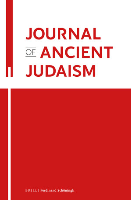
Journal of Ancient Judaism
Scope & Guideline
Exploring the Rich Tapestry of Ancient Jewish Heritage
Introduction
Aims and Scopes
- Historical Analysis of Ancient Texts:
The journal focuses on the critical examination and interpretation of ancient Jewish texts, including but not limited to biblical scriptures, apocrypha, and writings from the Second Temple period. - Interdisciplinary Approaches:
It encourages contributions that integrate historical, literary, archaeological, and theological perspectives to provide a richer understanding of ancient Judaism. - Cultural and Social Contextualization:
Research often explores the cultural, social, and political dynamics that influenced the development of Jewish thought and practice in antiquity. - Thematic Studies on Identity:
The journal frequently addresses themes of identity, including gender, ethnicity, and diaspora relations, particularly in the context of ancient Jewish communities. - Reception History:
It examines how ancient Jewish texts have been received and interpreted throughout history, highlighting their impact on later Jewish thought and broader cultural contexts.
Trending and Emerging
- Intersection of Memory and Politics:
Recent publications highlight the interplay between memory, identity, and political power, especially in the context of ancient Jerusalem and its historical narratives. - Queer and Gender Studies:
There is a growing interest in queer theories and gender studies, examining how these perspectives can reshape our understanding of ancient Jewish texts and figures. - Material Culture and Identity:
Research increasingly focuses on the role of material culture, such as inscriptions and artifacts, in shaping and reflecting ancient Jewish identities and practices. - Ethics and Moral Philosophy:
Emerging themes explore ethical dimensions and moral philosophies present in ancient Jewish texts, indicating a trend towards philosophical interpretations. - Diaspora Studies:
The journal is seeing an increase in studies examining the experiences and identities of Jewish communities in the diaspora during the Second Temple period, reflecting broader trends in Jewish studies.
Declining or Waning
- Traditional Historical Narratives:
There appears to be a waning focus on traditional narratives that solely emphasize historical events without critical engagement with the texts' cultural contexts. - Exclusive Textual Studies:
Research that centers exclusively on single texts without interdisciplinary connections is becoming less common, as the journal moves towards more integrative studies. - Static Gender Roles in Ancient Judaism:
Themes that reinforce static or traditional views of gender roles in ancient Jewish society are less frequently explored, with a shift towards more nuanced discussions of gender dynamics. - Overemphasis on Hellenistic Influence:
While the Hellenistic context remains important, the journal has seen a decline in papers that overly emphasize this influence at the expense of indigenous Jewish perspectives.
Similar Journals
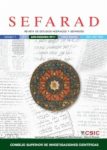
SEFARAD
Exploring the Depths of Iberian Jewish HeritageSEFARAD, published by the CONSEJO SUPERIOR INVESTIGACIONES CIENTIFICAS-CSIC, is a renowned open-access journal that has been a pivotal platform for scholarly communication since its inception in 1996. Based in Spain, it caters to a diverse readership across multiple disciplines, including Cultural Studies, History, Literature and Literary Theory, Religious Studies, and Linguistics and Language. The journal has successfully established itself within respected academic circles, achieving Q2 rankings in both History and Literature and Literary Theory as per the 2023 category quartiles, emphasizing its significance in these fields. With a commitment to fostering interdisciplinary dialogue and enhancing understanding of the Jewish heritage and culture in the Iberian Peninsula, SEFARAD presents original research articles, comprehensive reviews, and critical essays that inspire further scholarly inquiry. Researchers, professionals, and students alike will find this journal an invaluable resource for contemporary studies in its vibrant subject areas.

Eirene-Studia Graeca et Latina
Cultivating Knowledge in the Realm of ClassicsEirene-Studia Graeca et Latina, ISSN 0046-1628, is a prominent academic journal published by the Institute of Classical Studies, Academy of Sciences of the Czech Republic. Focusing on the fields of Classics, Linguistics, and Archaeology, this journal serves as a vital platform for scholarly discourse and research dissemination since its inception in 2002. Although it operates under a traditional access model, the journal has established itself within the academic community, evidenced by its placement in the Q4 category across multiple disciplines in 2023. This includes significant rankings in areas such as Archaeology and Language and Linguistics, where it finds itself within the 27th to 16th percentiles of its respective categories. Eirene aims to foster the advancement of research in the Humanities, providing a rigorous forum for scholars and practitioners interested in classical studies. Its contribution to the academic landscape is essential for those who aspire to explore the depths of ancient languages, cultures, and methodologies, making it a valuable resource for researchers, professionals, and students alike.

BULLETIN OF THE AMERICAN SOCIETY OF PAPYROLOGISTS
Fostering Dialogue on Ancient CivilizationsThe Bulletin of the American Society of Papyrologists is an esteemed journal dedicated to advancing the field of papyrology and related studies in archaeology and history. Published by Peeters, this journal offers a rich array of scholarly articles that delve into the analysis and interpretation of ancient manuscripts and inscriptions, shedding light on historical contexts and cultural nuances. Its impressive impact factor places it in the Q1 category for history and Q2 for archaeology in the 2023 rankings, affirming its significance within the academic community. Though not an open-access publication, the journal remains accessible to researchers and institutions, fostering a collaborative environment for sharing discoveries and scholarly dialogue. With its publication history dating back to 2002, the Bulletin continues to be an essential resource for scholars, historians, and students interested in the complexities of ancient texts and civilizations.

BIBLICA
Connecting Past Wisdom with Present ChallengesBIBLICA is a prestigious academic journal devoted to the study of biblical texts, their historical contexts, and theological implications. Published by PEETERS in Italy, this journal has made significant contributions to the field of Religious Studies since its inception, achieving a commendable Q3 rank in the current category quartiles for 2023. With an ISSN of 0006-0887, BIBLICA engages a diverse readership, providing a platform for scholarly articles that address both contemporary and historical issues related to biblical literature. Although it does not offer open access, its reputation and rigorous peer-review process ensure that each publication is of high scholarly merit. With convergence spanning from 2002 to 2023 and Scopus rankings placing it at #341 out of 644 in Arts and Humanities, BIBLICA serves as an essential resource for researchers, professionals, and students seeking insights into biblical studies and its myriad implications in the modern world.
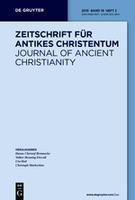
ZEITSCHRIFT FUR ANTIKES CHRISTENTUM-JOURNAL OF ANCIENT CHRISTIANITY
Illuminating the Legacy of Early ChristianityZEITSCHRIFT FUR ANTIKES CHRISTENTUM - JOURNAL OF ANCIENT CHRISTIANITY is a prominent academic journal published by Walter de Gruyter GmbH, dedicated to advancing the study of ancient Christianity within the rich contexts of Classics, History, and Religious Studies. With its roots extending from 1997 to 2024, this journal has made a significant contribution to its fields, earning a noteworthy Q3 ranking in both Classics and History, and a Q4 ranking in Religious Studies as of 2023. Positioned in Germany, the journal serves as a vital platform for researchers, scholars, and students, facilitating the dissemination of innovative research and critical discourse. Although it does not currently offer open access, its rigorously peer-reviewed articles provide valuable insights and enhance the understanding of ancient Christian phenomena. The journal aims to bridge historical narratives with contemporary scholarly discussions, making it an indispensable resource for anyone interested in the evolution and impact of Christianity throughout history.

JEWISH SOCIAL STUDIES
Fostering intellectual discourse on the multifaceted dimensions of Judaism.Jewish Social Studies is a prominent peer-reviewed journal published by Indiana University Press, dedicated to advancing the field of Jewish scholarship through interdisciplinary exploration and critical inquiry. With an ISSN of 0021-6704 and an E-ISSN of 1527-2028, this journal has become a vital resource for researchers and scholars, achieving Q2 rankings in both History and Religious Studies, as well as strong standings in Anthropology and Cultural Studies. The journal bridges the gaps between diverse academic disciplines, focusing on the multifaceted dimensions of Jewish life, culture, and history, making it essential reading for anyone engaged in the study of Judaism. Although it does not currently offer Open Access options, the journal promotes a wealth of rigorous research, critical perspectives, and in-depth analyses that contribute significantly to the understanding of Jewish Studies from 1975 to the present day, with ongoing issues scheduled until 2024. With an established audience of scholars, professionals, and students, Jewish Social Studies remains a leading platform for intellectual discourse and scholarly exchange in the humanities.
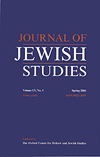
JOURNAL OF JEWISH STUDIES
Cultivating Knowledge in Jewish Literature and ReligionJOURNAL OF JEWISH STUDIES, published by the Oxford Centre for Hebrew and Jewish Studies, stands as a distinguished platform for scholarly discourse in the fields of Jewish history, culture, literature, and religious studies. With its ISSN 0022-2097, this journal is recognized for its significant contributions to understanding Jewish heritage and thought, achieving commendable rankings in various categories, including Q1 in Literature and Literary Theory and Q2 in History and Cultural Studies, as of 2023. The journal fosters rigorous academic engagement and encourages researchers and scholars worldwide to explore the complexities of Jewish identity and its interconnections with broader historical narratives. Operating without an open access model, it nonetheless ensures a wide reach through its well-regarded reputation, making it an essential resource for anyone invested in Jewish studies. With a publication history spanning from 2002 to 2024, the journal continues to serve as an invaluable repository of knowledge and insight for students, researchers, and professionals alike.
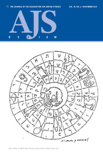
AJS Review-The Journal of the Association for Jewish Studies
Connecting Disciplines to Enrich Jewish Academic DiscourseAJS Review - The Journal of the Association for Jewish Studies is a leading academic journal published by the University of Pennsylvania Press, dedicated to advancing scholarship in Jewish studies. With its ISSN 0364-0094 and E-ISSN 1475-4541, the journal offers a rich compendium of research from various disciplines, including cultural studies, history, literature and literary theory, and religious studies. Recognized within the Q2 and Q3 quartiles across multiple categories in 2023, AJS Review provides an esteemed platform for academics to disseminate innovative ideas and engage with critical issues relevant to Jewish history and culture from 1976 to 2024. Although not an open-access journal, it ensures that high-quality, peer-reviewed articles are available to a global audience, enabling researchers, professionals, and students to foster deeper insights into Jewish narratives and heritage. By promoting interdisciplinary dialogue, AJS Review is integral to the academic community, offering valuable contributions to our understanding of Jewish studies and its broader implications.

Nordisk Judaistik-Scandinavian Jewish Studies
Exploring Jewish Heritage in the Heart of ScandinaviaNordisk Judaistik-Scandinavian Jewish Studies is a distinguished academic journal dedicated to the exploration of Jewish culture, history, and religious practices in the Scandinavian context. Published by the DONNER INSTITUTE FOR RESEARCH ON RELIGIOUS AND CULTURAL HISTORY in Finland, this journal has been an open access platform since 2016, allowing easy dissemination of knowledge and fostering scholarly communication among researchers, educators, and students. With a variety of subjects encompassing Anthropology, Cultural Studies, History, and Religious Studies, the journal has achieved commendable recognition, with its latest rankings placing it in Q2 in several categories according to the 2023 Scopus rankings. The journal's significant contribution to the field is evident through its impact, evidenced by its strategic position within its respective quartiles. By bridging interdisciplinary methodologies and Jewish studies within a Scandinavian framework, Nordisk Judaistik serves as an essential resource for those engaged in the complexities and nuances of Jewish heritage and identity in the region.
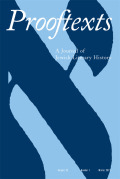
PROOFTEXTS-A JOURNAL OF JEWISH LITERARY HISTORY
Decoding the Rich Tapestry of Jewish Literary TraditionsPROOFTEXTS: A Journal of Jewish Literary History, published by Indiana University Press, is a premier academic journal dedicated to the exploration and critical analysis of Jewish literature and its historical contexts. With an ISSN of 0272-9601 and an E-ISSN of 1086-3311, this journal not only serves as a platform for innovative scholarship but also aims to foster dialogue among scholars in the fields of Cultural Studies, Literature and Literary Theory, and Religious Studies. As evidenced by its 2023 Scopus ranking—place within the third quartile in Cultural Studies and Religious Studies, and second quartile in Literature and Literary Theory—PROOFTEXTS stands out as a significant contributor to academic literature, attracting a diverse readership of researchers, professionals, and students alike. The journal’s commitment to open access is limited, thus ensuring a selective dissemination of high-quality research materials. Researchers are encouraged to contribute their insights and engage with the intricate narratives that shape Jewish literary heritage from 2002 to its convergence during select years, highlighting the ongoing evolution and relevance of this vibrant field. For in-depth understanding of Jewish literary history, PROOFTEXTS remains an indispensable resource.